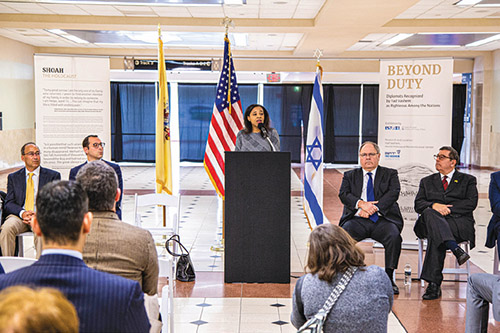


During the bleak days of the Holocaust, when acts of trust and humanity were an exception to the rule, there stood those individuals brave enough to stand against the widespread hate and intolerance in order to help their fellow man. Among such heroes were diplomats from different nations who put their lives and careers on the line to help Jewish citizens gather papers, visas and other documents they needed to escape Nazi occupation and persecution. Many did this without asking permission from their respective governmental superiors. Others acted in spite of their nation’s refusal to help.
In order to help keep the consequences of the Holocaust—and its heroes—alive in the public’s memory, the Consulate General of Israel and the New Jersey-Israel Commission collaborated with NJ Transit to honor diplomats recognized by Yad Vashem as “Righteous Among the Nations.”
Through this collaboration, the consulate set up the Beyond Duty exhibit, a Holocaust memorial exhibit, on the upper concourse of the Secaucus Junction train station, whose corridors see an average of 26,000 commuters on any weekday, according to Andrew Gross, New Jersey-Israel Commission’s executive director.
Posters lined up around the center of the station highlighted the stories of different diplomats such as Aristides de Sousa Mendes, a Portugeuse consul who issued thousands of visas to Jews escaping France, despite the fact that the Portugeuse government ordered its diplomats to deny them such a haven. For his actions, Sousa Mendes was stripped of his title, and his reputation and that of his children were disgraced shortly thereafter. His poster is one of many that stand out at the exhibit, and his accompanying quote describes his motivation to act as he did: “I would rather stand with God against man than with man against God.”
The most moving of the ceremony’s speakers was Holocaust survivor Ed Mosberg, 94, who lost his family to the war.
“I faced death so many times,” he said. After living in the Krakow ghetto, Mosberg and his family moved to the Plaszow concentration camp, where he worked under the cruel and infamous commander Amon Goeth. Mosberg was then sent to Auschwitz and later to Mauthausen-Gusen, a concentration camp in Austria. After the war, Mosberg moved to Poland and then to Belgium, where he met his wife before finally immigrating to the U.S.
Mosberg remains outspoken about his experiences as a survivor.
“It is my duty and obligation to talk,” he said. Whether it be a small group of five people or a large audience of 15,000, he has done his part to share his story. In May of 2019, Polish President Andrzej Duda awarded Mosberg with an “Order of Merit,” which marks the highest recognition a civilian can receive from the Polish president.
Among others who spoke at the exhibit’s opening ceremony were New Jersey Secretary of State Tahesha Way and Ambassador Dani Dayan, consul general of Israel.
Dayan emphasized the risks that the diplomats took to ensure the safety of the Jewish people.
“During days in which humanity lost its moral compass, they did not remain impassive,” he said. “They took action.”
From their actions Dayan has learned two lessons.
“When the scourge of anti-Semitism, the scourge of hatred, raises its ugly head, we have to act courageously and immediately,” he said. “Only the existence of a robust, secure, strong and independent Jewish state in the land of Israel can guarantee that the phrase ‘never again’ is not a shallow slogan, but a reality.”
While he acknowledged that the challenges that the Jewish people currently face are to be viewed on a vastly different scale than those of the Jews during the time of the Holocaust, he believed that the Jewish people of today are more experienced when it comes to confronting intolerance, and that society has the power to utilize law enforcement and education in order to temper instances of anti-Semitism and racism.
Way, who oversees the New Jersey-Israel Commission, the state’s historical commission, museum and archives, said she felt committed to the preservation and exploration of history, and was grateful that such an exhibit is to be displayed for public consumption and discussion in New Jersey.
“We can come together and share, and make certain, that the current and future generations do know these important truths,” she said. Way also spoke of her recent visit to Yad Vashem in Israel, where she felt deeply moved by the stories and exhibits there.
Both Way and Dayan were eager to confirm that Israel and New Jersey share strong personal ties, and both touched on the recent anti-Semitic events that have occurred both in the state and around the country.
Way stressed that New Jersey continues to stand in support of its “brothers and sisters in the Jewsh community.”
After the ceremony, Dayan acknowledged that the event held more gravity in light of the recent anti-Semitic attacks, but clarified that the exhibition was not orchestrated in reponse to those events in particular.
“The fact that it happens in a sudden context in which we are a few miles away from Jersey City where two Jews were killed by an anti-Semite—yes, it gives more relevance to the event,” he said, “but I wouldn’t say it’s a response to that. We should honor those diplomats and those individuals regardless of these or other events.”
Other speakers at the ceremony included New Jersey Department of Transportation Commissioner and NJ Transit Board Chair Diane Gutierrez-Scaccetti, New Jersey Director of Homeland Security and Preparedness Jared Maples, New Jersey-Israel Commission Chair Mark Levenson and New Jersey Transit Police Chaplain Rabbi Yosef Carlebach.
The exhibit will remain open to the public at the station’s upper concourse until Wednesday, February 19.
By Elizabeth Zakaim
�













